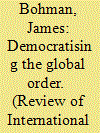| Srl | Item |
| 1 |
ID:
095616


|
|
|
|
|
| Publication |
2010.
|
| Summary/Abstract |
While there is much discussion of the need for democracy in transnational institutions, there is less discussion of the conditions for their democratisation. To address this deficit, a general account of democratisation is necessary. I propose that democratisation is dependent on the joint realisation of two conditions: communicative freedom and communicative power. Democratisation thus requires, first, publics and associations in which communicative freedom is realised on the one hand; and, second, institutions that link such freedom to the exercise of communicative power to decision making on the other. In order for these conditions to be met, civil society must be expanded into the public sphere. The transformation of communicative freedom into communicative power can be promoted only by institutions that recognise the decisional status of publics, which in turn depend on civil society to generate the deliberative benefits of the plurality of perspectives. Communicative power is not merely spontaneously generated through publics, but also through publics expressly formed through democratic institutional design.
|
|
|
|
|
|
|
|
|
|
|
|
|
|
|
|
| 2 |
ID:
090134


|
|
|
|
|
| Publication |
2009.
|
| Summary/Abstract |
For Kant and many modern cosmopolitans, establishing the rule of law provides the chief mechanism for achieving a just global order. Yet, as Hart and Rawls have argued, the rule of law, as it is commonly understood, is quite consistent with "great iniquities." This criticism does not apply to a sufficiently robust, republican conception of the rule of law, which attributes a basic legal status to all persons. Accordingly, the pervasiveness of dominated persons without legal status is a a fundamental violation of the rule of law. This legal status can be understood in Kant's sense as an original "right to freedom," one that is not derived from or acquired by membership in a community or from citizenship. The realization of this kind of legal status can already be found in the "cosmopolitan constitutions" of many democracies, which include rights of persons (and not just citizens) to habeas corpus and other statuses that protect those vulnerable to domination. In order that all persons have the appropriate institutional space within which to exercise the powers of persons to address and make claims, institutions such as human rights courts to which those who lack legal status can appeal and be recognized are necessary for a form of the rule of law that is adequate to current circumstances.
|
|
|
|
|
|
|
|
|
|
|
|
|
|
|
|